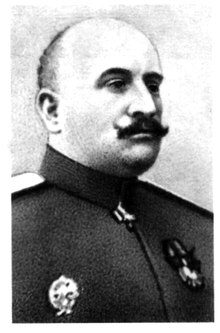Aleksandr Krymov
| Aleksandr Mikhailovich Krymov | |
|---|---|

Alexandr Krymov
|
|
| Born | October 23, 1871 |
| Died | August 31, 1917 (aged 45) |
| Allegiance |
|
| Service/ |
|
| Rank | General of the cavalry |
| Commands held | 3rd Cavalry Corps Savage Division |
| Battles/wars |
Russo Japanese War World War I |
| Awards | See awards |
Aleksandr Mikhailovich Krymov (October 23, 1871—August 31, 1917, Russian: Крымов Александр Михайлович) was a Russian Imperial Lieutenant General, a military commander of Russo-Japanese War, World War I, and Russian Revolution times.
On April 4, 1917, he was appointed acting commander of the 3rd Cavalry Corps, which included the Savage Division. He refused to accept the appointment of Military Minister by the Russian Provisional Government. On August 24, 1917 Commander-in-Chief Lavr Kornilov appointed Krymov commander of the detached Petrograd Army (отдельная Петроградская армия ) to secure the Russian capital of Petrograd.
Krymov was part of the nobility of the Warsaw Governorate. Krymov participated in the Russo-Japanese War and World War I.
On 25 August, Kornilov's troops were given the order to occupy Petrograd, disperse the Soviet, and disarm the city's garrison in case of a Bolshevik uprising. He was given the order to advance on the capital to rescue the Provisional Government from what was believed to be a Bolshevik coup. On 29 August, Kerensky made himself commander-in-chief, and ordered Krymov via cable to halt the advance of his troops, some of whom were moving through the southern suburbs of Petrograd. The Soviet executive in the capital now decided to support the now 'Revolutionary Dictator' Kerensky on news of the advance of Krymov's soldiers, and his troops were 'harangued' by Bolsheviks. Krymov and his staff, travelling on the train of the 1st Don Cossack Division, were halted at Luga by the railway workers, and they continued to be harangued by Soviet deputies. Powerless, Krymov could only watch in his train compartment as Cossacks in large numbers defected to the Soviet side. On 30 August he agreed to travel with a government representative to Petrograd, and on 31 August he met with Kerensky, where he tried to explain that he had only brought his troops in an attempt to defend the government, but Kerensky ordered him to trial by military court.
...
Wikipedia
